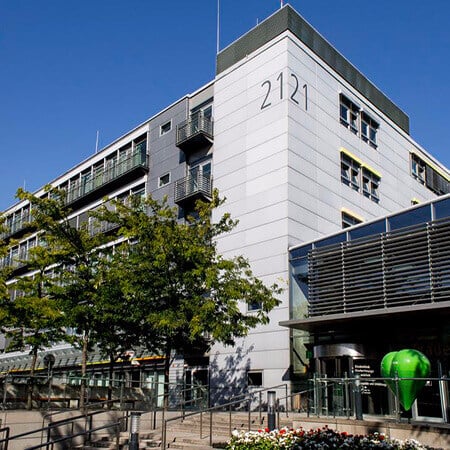About the disease
Insulinoma is a benign tumor of the pancreas which originates in the beta cells responsible for insulin secretion. Insulinoma is the rarest cancer of endocrinal system. It also never metastases into other organs. Insulinoma derives from beta cells and secrets insulin. If the person has insulinoma, the level of blood glucose in his blood circulation is very low, because the secretion of the insulin does not function properly. If the pancreas generates too much insulin, a person may develop insulinoma. Pancreas is located in the abdomen and it produces hormones among which insulin is one of the most vital as it reduces sugar level in blood. If the level of sugar becomes too low or too high, the pancreas stops producing insulin. In case the pancreas produces too much insulin which is not proportional to the level of blood sugar, insulinoma may develop.
The most well-known insulinoma cause is hypoglycemia, when blood sugar is low. If the case of hypoglycemia is not severe, the person feels anxiety, dizziness and hunger. If hypoglycemia is progressed, it may result in much more serious outcomes, such as coma or death.
Another insulinoma cause is the genetic predisposition. Usually people may develop insulinoma after 40 years old, because children have cells in the pancreas, which can release the excessive amount of insulin and regulate its level. Almost all insulinomas are benign, that`s why they are not as dangerous as malignant tumors.
Symptoms
- Seizures
- Changes in behaviour
- Anxiety attacks
- Weight gain
- Dizziness
- Sweating
- Constant hunger
- Headache
- Anger
- Speech disorder
Usually there are no symptoms during the initial phase of tumor development. After it is bigger than 50 mm, hypoglycemia symptoms become apparent. Usually it includes increased appetite and development of obesity. Even after food consumption, he still feels hunger and begins to overeat systematically. Episodes of sudden hunger can occur even at night when a person suddenly wakes up and has an urgent need to eat something. As a result the central nervous system violates its functions and a person may have an acute hypoglycemic attack. Usually the attack begins in the morning when the person did not eat for several hours. During that period glucose level starts to drop by several levels. If the hypoglycemic attack is mild, person feels only certain neurological disorders, which includes weakness and headache. The person also feels dizzy, cannot concentrate, stand up for a long time or speak in a prolonged manner, he is usually very sleepy and needs something sweet to eat.
If hypoglycemic attack is more severe, the person has absolutely opposite insulinoma symptoms. He suddenly becomes over excited and agitated, feels restlessness and euphoria, which can even result in colorful hallucinations. Euphoria may suddenly turn into unmotivated aggression, when the person starts to scream or cry without any obvious reason. Hypoglycemic attack is in most cases accompanied by tremor, cold sweat and tachycardia. If the attack progresses, the person may get into coma. The attack is usually cured with intravenous administration of glucose. After the return of consciousness patients usually do not remember anything what happened. They become very tranquil and relaxed. The attack can cause not only coma, but also a heart attack, because the heart valves during the seizure stop working properly. In that case the patient requires immediate medical help.
Diagnosis
The diagnosis of insulinoma is usually carried out during blood tests. The blood test determines the level of glucose and insulin in the blood and if the levels are either too high or too low the patient undergoes the magnetic resonance scan or the ultrasound too see if there is tumor. If the patient was diagnosed with hypoglycemia, he also needs to undergo complex laboratory tests to understand the reason of low blood sugar level. Usually the patient needs to go through starvation to create a hypoglycemic state and to analyze the reaction of the body to it.
Sometimes doctors small doses of insulin can be injected to check body reaction.. The level of insulin in healthy people is significantly lower for those who have tumor and that`s why the insulin is introduced into blood to maintain the proportional ratio between glucose and sugar.
In some cases it is very difficult to distinguish insulinoma from the moderate case of hypoglycemia. Usually hypoglycemia is caused by alcohol or grugs abuse, that`s why the doctor always asks the patient about his drinking habits and the names of drugs he takes. Insulinoma symptoms apart from everyting resemble the symptoms of adrenal cancer as well.
Treatment
The treatment of insulinoma usually requires surgical resection. In most cases surgery involves resection of the affected part of the pancreas. Surgery is considered to be successful, if the level of glucose and insulin normalizes. Nevertheless, there may be such post-operative complications as the necrosis of the pancreas which means that the cells of the pancreas become dead. Surgery can also result in peritonitis and in that case the patient requires another operation.
If insulinoma is inoperable which may happen if its size is too big or location inaccessible, doctors apply conservative treatment. Thus type of treatment applies drugs that can prevent the development of hypoglycemia by introducing adrenaline into the body. In the initial stages of conservative treatment the patient is usually recommended to intake high amounts of carbohydrates.
If insulinoma is malignant, in addition to surgery doctors may administrate several courses of chemotherapy. Radiofrequency intervention is usually not applied for the insulinoma treatment.
People who have underwent surgery later need to be regularly examined by neurologist and an endocrinologist. They also need to have their blood test taken every month to screen the level of glucose and insulin in blood. Patients usually have to balance their diet, which should include vegetables and fruits. They must also avoid sweets and fatty food.
Authors: Dr. Nadezhda Ivanisova, Dr. Sergey Pashchenko
















